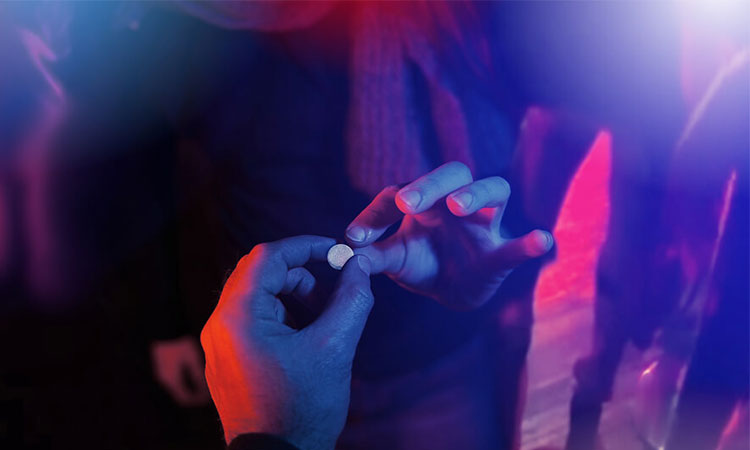
The Dangers of Mixing Molly and Alcohol – Combining any drug with alcohol is risky, but using Molly (MDMA) while also consuming alcohol is especially dangerous. It can result in severe dehydration and increase the risk of organ damage as well as the potential for risky behaviors, such as drunk driving or engaging in unsafe sex.
Both Molly and alcohol use alone can lead to dehydration, especially when used in the typical club/rave environments where people are dancing and sweating profusely. Alcohol is a central nervous system depressant, and MDMA is a stimulant with mild hallucinogenic properties.
Moreover, these substances induce contrasting effects, and the use of MDMA can mask alcohol’s sedating properties. This effect can result in the consumption of an excessive amount of alcohol, which may, in turn, lead to acute alcohol poisoning.
Why Do People Mix Alcohol and Ecstasy?
Molly is commonly found at electronic dance music festivals, concerts, and in the rave scene. Because alcohol use is prevalent at such venues, the combining of the two substances is common. Some people use both substances to enhance the euphoric effects of Molly, and research has provided a good explanation for why this occurs.
A study in the Journal of Pharmacology and Experimental Therapeutics from 2002 examined the interaction between MDMA and alcohol. Investigators found that the concentration of MDMA in the subject’s blood increased 13% after they drank alcohol. And although the MDMA-alcohol cocktail actually reduced blood alcohol concentration by up to 15%, study participants experienced a euphoric high that lasted longer than when they used either substance alone.
The study also revealed that while MDMA decreased alcohol’s sedating effects, it did not reduce levels of intoxication. Furthermore, the researchers concluded that this overall effect could have dangerous consequences, as an individual might feel much less intoxicated than they actually are. This outcome could increase the chances of impaired driving and other risk-taking behaviors.
Fortunately, the risk of MDMA addiction is low. But, because combining Molly and alcohol induces a longer-lasting high, researchers have theorized that mixing the substances could result in higher abuse potential than using just MDMA alone.
Health Effects of Combining Molly and Alcohol
Mixing ecstasy and alcohol can lead to significant health complications, including dehydration and organ damage. According to a report from the Substance Abuse and Mental Health Administration (SAMHSA, 2003), there were more than 10,000 MDMA-related ER visits in 2011, nearly 30% of those visits also involved alcohol consumption. News reports of young adults being hospitalized after combining Molly and alcohol at electronic dance music festivals and raves are common.

Overheating and Dehydration
As noted, Molly overdoses are often associated with overheating (hyperthermia) and severe dehydration. Reportedly, some people’s body temperatures have climbed as high as 110 degrees, often after dancing and being hyperactive for hours on end, and not drinking enough water to compensate for lost fluids. Alcohol, which is a diuretic, can exacerbate Molly-related dehydration, leading to heatstroke, kidney failure, and death.
Organ Damage
If used independently, Molly and alcohol can both cause damage to the brain and liver. Mixing Molly and alcohol together further increases the risk of brain and liver damage. Studies on rats have suggested that combining alcohol and MDMA may also adversely impact the heart. A study from 2015 published in the journal PLOS One revealed that using the two together increased stress on the rodents’ hearts at the cellular level.
Other Effects
Research from 2011 published in the journal Psychopharmacology found that adolescent mice who were administered MDMA and alcohol appeared anxious and depressed, and exhibited impaired movement. The animals also showed brain inflammation upon autopsy.
Like many drugs, Molly causes an unnatural spike in the body’s feel-good chemicals, and as a person comes down from the drug, the brain is depleted of serotonin, a neurotransmitter related to feelings of well-being. Thus, negative feelings such as anxiety and depression may manifest as the drug is gradually eliminated from the system.
If a person combines alcohol and Molly, his or her mood is probably not going to be any better during withdrawal. This consequence is due to alcohol’s own effect on chemicals in the brain vital for mood regulation.
Treatment for Addiction
MDMA has a low potential for addiction, but there is some evidence that people may develop a psychological dependence. Alcohol is, of course, highly addictive, and alcoholism is among the most common and devastating diseases in the world today. Using the two substances together even once can be extremely dangerous, and people who use them in conjunction on a frequent basis may experience even more unhealthy long-term complications.
Recovery By The Sea is a specialized addiction treatment center that provides support and care for both alcoholism and drug abuse. Using evidence-based services vital to the recovery process, we provide our patients with the knowledge, support, and tools they need to fully recover and begin to experience a healthier, more fulfilling life.
If you or someone you love is struggling with alcohol addiction and/or is abusing prescription or illicit drugs, please contact us as soon as possible. Discover how we help people free themselves from the grip of addiction and learn how to maintain long-lasting wellness and sobriety!